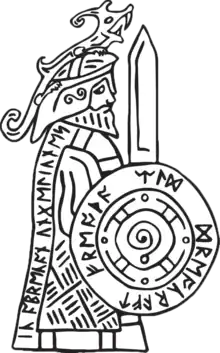Arwald
Arwald[lower-alpha 1] (died 686 AD) was the last King of the Isle of Wight and last pagan king in Anglo-Saxon England.[2]

Life and Death
Nearly all that is known of him is from Bede's Historia ecclesiastica gentis Anglorum, which describes the invasion of the Isle of Wight by Cædwalla, King of Wessex.
It is unclear what Arwald's heritage was, but it is speculated that he was Jutish and was a local Island warlord.
Arwald was killed in battle, but his two sons escaped to the Great Ytene Forest (now called the New Forest).[3] They were betrayed to Cædwalla and taken to a place where he "was in hiding with his wounds" at Stoneham, near Southampton. Shortly before they were put to the sword they allegedly converted to Christianity by the intervention of Abbot Cynibert of Hreutford,[4] being described by Bede as "the first fruits" of the massacre because of this conversion. Cædwalla later died of wounds sustained during his invasion.
Though venerated as saints, their names are unknown, but they are called collectively "St. Arwald" after their father. Their feast day is 22 April.[5]
Arwald's unnamed sister survived, as the wife of the king of Kent. She is a direct ancestor of Alfred the Great.
Legacy
An annual gathering happens on the evening of the first Monday after the 22nd of April at Sandown Library on the Isle of Wight to commemorate the anniversary of death of Arwald. The evening consists of poetry, dramatic readings and music and is often streamed live to people all around the world.
In 2020 a community of Isle of Wight druids held a ceremony at the Longstone near Brighstone. This was done as a podcast.[6]
The Quay Arts Centre in Newport exhibited an Isle of Wight Hidden Heroes exhibition which included a sculpture of a mask of Arwald by Nigel George. This is now on permanent display at Newport Roman Villa.[7]
Caedwalla by Frank Cowper (1888) portrays Arwald as the pagan antagonist to the Christian Caedwalla.[8] A similar juxtaposition, but from a pagan viewpoint, is employed by Jan Harper Whale's Wihtwara Trilogy.[9]
Arwald's Kingdom; Tales from the Isle of Wight (2018) by Mark Francis is a book of poetry, stories and hiking around the Isle of Wight.[10]
Notes
References
- Yorke, Barbara (1997). Wessex in the Early Middle Ages. London: Routledge. p. 66. ISBN 0-415-16639-X.
- "Timeline of Christianity" Archived 2014-03-03 at the Wayback Machine, Shropshire Christian Religion
- Monks of Ramsgate. "Arwald". Book of Saints, 1921. CatholicSaints.Info. 1 August 2012
- Stanton, Richard (1892). A Menology of England and Wales. Burns & Oates.
- "April", Latin Saints of the Orthodox Patriarchate of Rome
- "Ceremony for King Arwald". soundcloud.com. 2020. Retrieved 6 February 2021.
- First name. "Isle of Wight Hidden Heroes at Quay Arts – Isle of Wight Hidden Heroes". Iwhiddenheroes.org.uk. Retrieved 6 February 2021.
- "Cædwalla". Gutenberg.org. 12 December 2016. Retrieved 6 February 2021.
- "wihtwara". wihtwara. Retrieved 6 February 2021.
- jan bayliss (29 March 2019). "Arwald's Kingdom: ~ Tales from the Isle of Wight: Amazon.co.uk: Francis, Mark, guys, & some dead: 9781540776266: Books". Amazon.co.uk. Retrieved 6 February 2021.